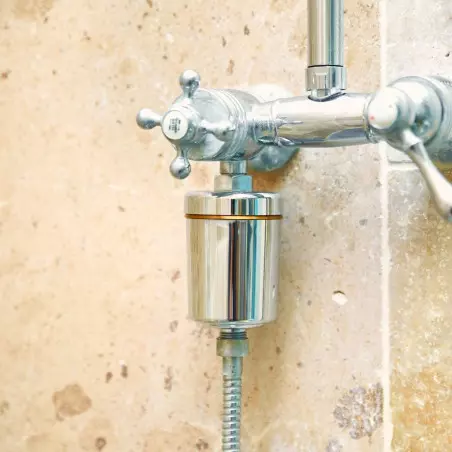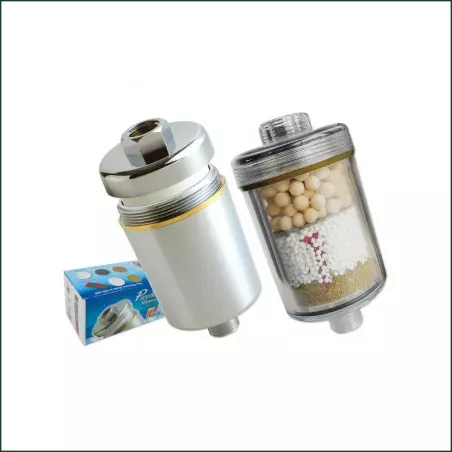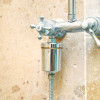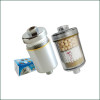Water that we use daily for our personal hygiene can have a significant impact on our health. While the quality of water intended for human consumption is a priority for many, we often forget that the water used for washing also plays an important role in our well-being. In this article, we will explore the reasons why it is crucial to filter the water in your shower and bath, focusing on absorption through the pores and inhalation.
After reading this article, you will understand:
- The impact of unfiltered water on your health,
- The pollutants present in tap water,
- How water is absorbed by your body during a shower or bath,
- The benefits of filtering your bathroom water,
- Practical solutions to improve your water quality.
Exposure to Unfiltered Water: An Underestimated Risk
The quality of the water we use for washing is often overlooked, yet it represents a source of exposure just as significant as the water we drink. Indeed, during a shower or bath, our skin, through the pores, absorbs many chemical compounds present in the water. Simultaneously, the vapors released can be inhaled, creating a stronger exposure than simply consuming water. This phenomenon, although invisible, constitutes an underestimated risk to our health.
Pores: A Gateway for Pollutants
The skin, our largest organ, plays an essential role in protecting our body. However, when exposed to unfiltered water, it can become a channel through which various pollutants enter our body.
Impact of Temperature and Duration of Exposure
- Water Temperature: The higher it is, the more the pores open, facilitating absorption.
- Duration of Exposure: The longer you stay in the shower, the longer the contact time between the water and your skin, thus increasing the amount of pollutants that can be absorbed.
Potentially Harmful Substances
- Chlorine: Used to treat municipal water, it can cause dry skin, irritations, and harm the skin's natural microbiome.
- Other Contaminants: There are other polluting substances such as pharmaceutical residues and heavy metals from poorly treated wastewater or aging infrastructure, posing various health risks.
Importance of Water Filtration
Shower and bath water filtration is essential to minimize these risks. By opting for suitable filtration solutions, you can:
- Reduce your skin's exposure to pollutants;
- Contribute to better overall health;
- Ensure increased protection for your epidermis.
By filtering your water, you take a proactive step to preserve your well-being and that of your family, while supporting a healthier and more sustainable lifestyle.
Inhalation of vapors: an unknown risk
When you take a shower, the steam created by the heat carries with it various pollutants present in tap water. Among these substances, the chlorine contained in the water is one of the most concerning. Commonly used to disinfect municipal water, it can transform into gas when heated, mixing with the vapors we inhale. This inhalation of chlorine, although unsuspected, can be more harmful than simply ingesting chlorinated water, as the respiratory tract is a direct entry into our bloodstream.
The dangers of inhalation go beyond chlorine, pharmaceutical residues and heavy metals can also volatilize and enter our body through the respiratory tracts. These harmful contaminants, once inhaled, can cause various health problems, ranging from mucous membrane irritation to more severe long-term effects, such as respiratory disorders or hormonal disruptions.
Scientific research highlights the importance of this exposure route. A study from theState University of New York showed that inhaling chlorine and its by-products during a shower can lead to faster and more intense absorption of these substances compared to ingestion (Smith et al., 2021). These findings reinforce the need to filter your shower water to minimize the inhalation of these pollutants, thus protecting your respiratory and overall health.

Pollutants present in tap water
Tap water, although essentially treated to be drinkable, often contains a variety of pollutants from different sources. These contaminants can have significant implications for our health, especially when we are exposed to them daily through showering and bathing.
Chlorine and its Derivatives
Chlorine is commonly used in municipal water treatment to eliminate pathogens. However, its interaction with organic matter present in water can lead to the formation of toxic by-products, such as trihalomethanes (THM). These compounds have been linked to various negative health effects, including skin irritations, respiratory problems, and an endocrine-disrupting potential. A study conducted by the United States Environmental Protection Agency (EPA) revealed that chlorine and THM levels are consistently higher in indoor air during and after showering, thus increasing the risk of inhalation (EPA, 2016).
Filtering your shower and bath water can significantly reduce exposure to these harmful substances. By choosing high-quality shower filters, you help reduce skin irritations, protect your respiratory system, and maintain the natural balance of your skin microbiome. This simple yet effective action has positive long-term health impacts, allowing you to fully enjoy your wellness rituals without compromise.
Other Concerning Pollutants
Tap water, although treated to ensure its potability, can harbor a variety of invisible but potentially dangerous contaminants. Among these, pharmaceutical residues are increasingly concerning. These substances mainly come from medications consumed by the population, a portion of which is excreted and ends up in wastewater systems. Although these residues are present at very low levels, their accumulation in the body over time can pose health risks. The effects can be subtle but include endocrine disruptions, which can alter the normal hormonal functioning of the body.
In addition to pharmaceutical residues, heavy metals are another category of concerning pollutants. These elements, such as lead and mercury, can enter tap water due to aging infrastructure and industrial practices. Prolonged exposure to heavy metals is particularly dangerous as it can lead to neurotoxic effects, kidney damage, and, in children, impair cognitive development. Reducing exposure to these contaminants is therefore essential to preserve health, especially for more vulnerable populations such as young children and pregnant women.
To minimize these risks, it is crucial to adopt effective filtration systems that specifically target these pollutants, including harmful chemicals. By filtering shower and bath water, you not only protect your skin and respiratory tracts, but you also contribute to a safer and healthier family environment.
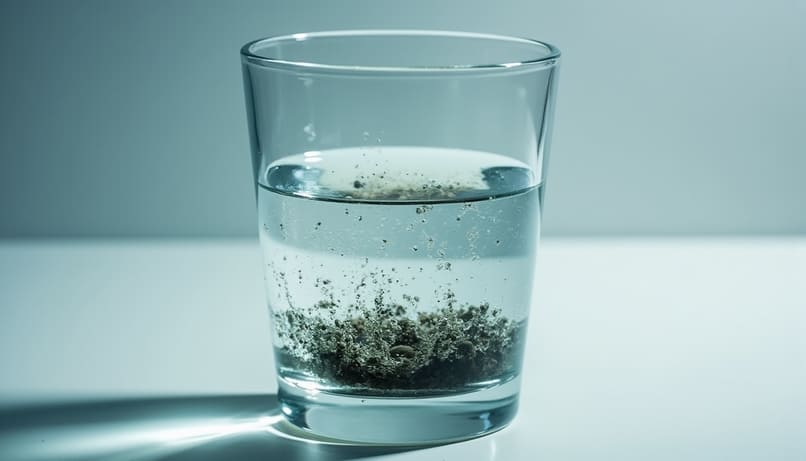
The benefits of shower and bath water filtration
Investing in a filtration system for your shower or bath is not just a luxury, but a necessity to improve your daily well-being. One of the first noticeable beneficial effects is the improvement of the health of the skin and hair. By eliminating chlorine and other pollutants, you reduce the risk of skin irritations and dryness, thus contributing to softer and more balanced skin. Additionally, hair also benefits from this purification, regaining shine and vitality while reducing issues of dry and fragile hair caused by the aggression of chemical substances.
By filtering the water, you significantly decrease your exposure to harmful substances such as pharmaceutical residues and heavy metals. This reduction in exposure is crucial for maintaining a healthy body environment, minimizing the risks associated with these invisible but potentially dangerous contaminants. Thus, filtering your bathroom water becomes an essential barrier against pollutants, helping to enhance your overall health while preserving the quality of your water.
Protection against chlorine and its effects
Chlorine is essential for disinfecting municipal water. However, daily exposure can lead to undesirable side effects. Filtering shower and bath water reduces these effects, providing tangible benefits for the health of your skin and respiratory tracts.
Benefits for the skin
- Reduction of skin irritations: Chlorine can dry out the skin, cause itching, and disrupt the skin microbiome, which is crucial for protecting against infections and maintaining skin hydration.
- Natural regeneration: Chlorine-free water promotes the natural regeneration of the skin, preserving its glow and softness.
Impact on the respiratory tracts
During a hot shower, chlorine turns into vapor. Inhaling it can cause respiratory irritations. By filtering your water, you protect your lungs from this unnecessary exposure, thus promoting a healthier respiratory system.
A proactive approach to your well-being
Choosing an effective filtration system is a proactive step to preserve your well-being. You protect your skin from chemical aggressions and strengthen your respiratory health, offering a safer and more pleasant shower environment.
To delve deeper, a study conducted by the National Center for Scientific Research (CNRS) showed that inhaling chlorine can have long-term effects on respiratory health (Reference: CNRS, 2021).
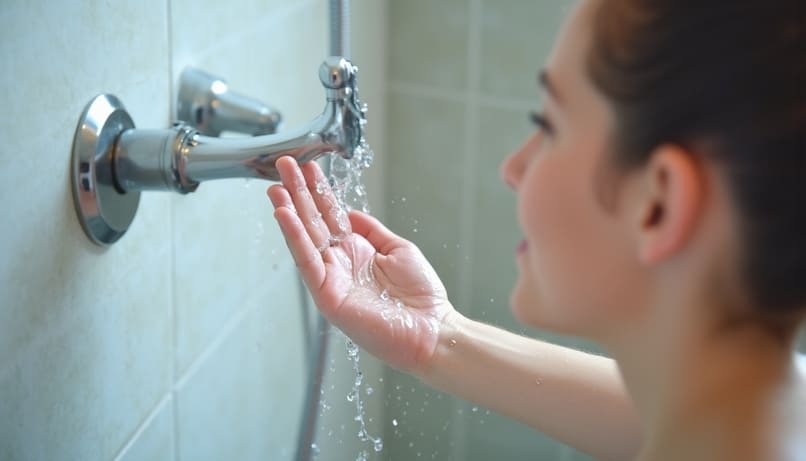
How to choose and install a filter for your shower or bath
Choosing the right filter for your shower or bath is essential to ensure clean and healthy water, free from potentially harmful pollutants. Among the benefits of filters, one can cite the reduction of irritating chemicals, the prevention of skin and hair problems, as well as an overall improvement in comfort when using water. With a variety of options available on the market, understanding the types of filters and selection criteria can help you make an informed choice that meets your specific needs.
The shower filters come in different forms, ranging from activated carbon models to multi-stage systems combining several filtration methods. Each has its own advantages, and the choice will mainly depend on the composition of your water and your personal preferences. When selecting a filter, ensure it can effectively reduce levels of chlorine, heavy metals, and other common pollutants present in tap water. Look for independent certifications that guarantee the filter's performance, such as the NSF/ANSI standard.
Installing a shower filter is generally a simple process that does not require advanced technical skills. Most models can be installed directly on the shower arm, without specific tools, and require minimal maintenance, such as periodic replacement of the filter cartridge. For detailed advice on the model available in our store, explore our page dedicated to our shower filter.
Regarding the bath, there are also effective solutions. Bathtub faucet filters are an excellent option, capable of treating the water before it fills your bathtub. They are often easy to install and can effectively reduce the presence of chlorine and other contaminants. For those looking for alternatives, filtering balls or dechlorinating powders can be added directly to the bathwater, providing additional purification.
Investing in a good filtration system for the shower and bath is a step towards a healthier lifestyle and respect for your overall well-being. Take the time to choose a solution that suits your needs and enjoy the many benefits of purified water.
Filtration options for the shower
When you decide to improve the quality of your shower water, several filtration options are available to you. These systems, equipped with an effective filtration capacity, allow the removal of impurities and pollutants thanks to advances in filtration technology. It is essential to choose a system suited to your specific needs to maximize the health benefits.
Activated carbon filter
- Reduce chlorine and certain volatile organic compounds,
- Work by trapping pollutants in their porous structure,
- Simple to install,
- Improve the overall quality of the water.
Multi-stage filters
- Combine multiple filtration technologies,
- Eliminate a wide range of contaminants, including heavy metals and pharmaceutical residues,
- Offer more comprehensive purification,
- Ensure healthier water for the skin and respiratory tracts.
Ion filters
- Designed to soften hard water,
- Reduce certain minerals and heavy metals,
- Particularly useful against lime deposits,
- Beneficial for skin problems like eczema.
Installation and maintenance
- Easy to install, often by simply screwing onto the existing shower arm,
- Follow the manufacturer's instructions for correct installation,
- Replace the filter cartridges according to recommendations to maintain optimal performance.
These filtration systems offer you the opportunity to transform your daily routine into a moment of care and health preservation, by reducing exposure to harmful substances while fully enjoying the benefits of clean and purified water.
Bath solutions
When thinking about water purification, it is essential not to overlook the water in our bath. Just like for the shower, bath water can contain various pollutants that deserve to be filtered to ensure a relaxing moment free from potentially harmful substances.
Bathtub faucet filters
A practical and effective solution to purify your bath water is the installation of specific filters on the bathtub faucet. These filters generally work by removing:
- Chlorine,
- Heavy metals,
- Other contaminants.
Before the water fills your bathtub, these filters act to provide you with purer water. Easy to install, they fit most standard faucets and do not require any special technical skills. By opting for a quality filter, you thus reduce the absorption and inhalation of pollutants during your bath. To maintain their effectiveness, it is important to regularly replace the filtration cartridges according to the manufacturer's recommendations.
Alternatives to purify bath water
Beyond faucet filters, there are alternative methods to improve the quality of your bath water:
- Filter Balls: A simple and non-invasive option. Just immerse them in the bathwater where they work to neutralize chlorine and reduce the presence of other substances. Often associated with natural elements such as activated charcoal or ceramics, they offer an immediate and reusable solution.
- Dechlorinating Powders: These powders, often based on vitamin C, can be added directly to the water. They neutralize chlorine and its derivatives while respecting the environment. They dissolve quickly and are easy to use, transforming your bath into a gentler and more pleasant experience for your skin.
By incorporating these simple solutions into your bathing routine, you take a proactive step to protect your health and that of your family. These actions, although seemingly modest, contribute to enhancing your well-being by minimizing exposure to daily pollutants.
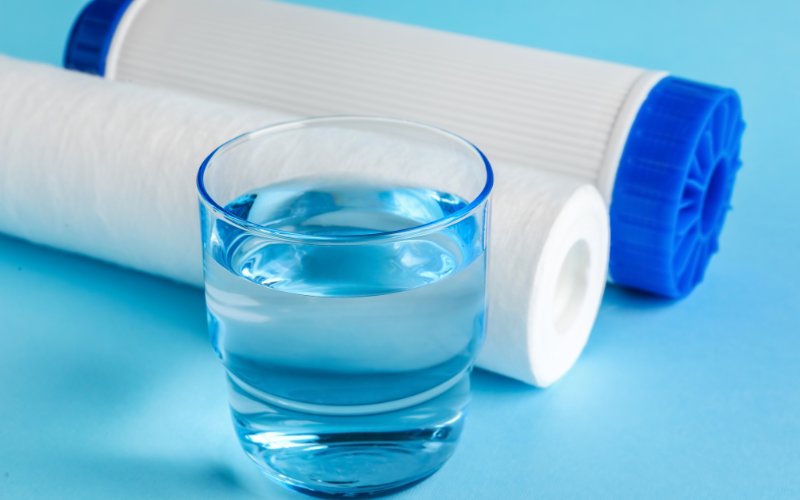
Conclusion
Filtering the water in your shower and bath is not just a comfort choice, it's an essential strategy to protect your health and that of your family. Reducing exposure to pollutants such as chlorine, pharmaceutical residues, and heavy metals has tangible benefits, ranging from improved skin health to protecting the respiratory tract. By taking proactive steps to improve water quality, you are investing in a healthier and more sustainable future.
By adopting filtration solutions tailored to your needs, you transform your bathing and shower routines into truly beneficial care moments. We encourage you to take these steps today to better protect your well-being. To continue receiving advice and information on natural health and living nutrition, feel free to subscribe to our newsletter. Enjoy exclusive access to tips, guides, and special offers for a healthy and environmentally friendly lifestyle.
Your Questions and Our Answers (FAQ)
Why is it important to filter shower and bath water?
Filtering shower and bath water is crucial to reduce exposure to pollutants such as chlorine, pharmaceutical residues, and heavy metals. These substances can be absorbed by the skin through the pores or inhaled as vapor, which can have a significant impact on health.
What are the risks associated with inhaling unfiltered shower vapor?
Inhaling shower vapor containing chlorine and other pollutants can be more harmful than simply ingesting contaminated water. It can lead to irritations of the respiratory tract and more severe long-term effects, such as respiratory disorders. A study from the State University of New York highlights that inhaling these substances can be faster and more intense than their consumption (Smith et al., 2021).
What contaminants are commonly found in tap water?
Tap water often contains chlorine, used to disinfect the water, as well as pharmaceutical residues and heavy metals such as lead and mercury. These substances can have various negative health effects, including skin irritations, respiratory problems, and endocrine disruptions.
How does water temperature influence the absorption of pollutants by the skin?
The higher the water temperature, the more the skin's pores open, facilitating the absorption of pollutants. Therefore, taking hot showers increases the penetration of harmful substances like chlorine and heavy metals into the body.
What are the solutions for filtering shower and bath water?
There are several solutions for filtering water, such as activated carbon filters for the shower, which reduce chlorine and volatile organic compounds. For the bath, bathtub faucet filters or filtering balls can be used to purify the water. These solutions help preserve the health of the skin and respiratory tracts.
What are the benefits of filtering water for the skin and hair?
By filtering the water, you eliminate chlorine and other pollutants, thus reducing skin irritations and dryness. This contributes to softer skin and a healthier scalp. Hair also regains shine and vitality without the aggression of chemical substances.
How to choose an effective water filter for the shower?
Choose a filter capable of effectively reducing chlorine, heavy metals, and pharmaceutical residues. Multi-stage filters are often recommended as they combine several filtration technologies. Ensure that the product is certified by recognized standards such as the NSF/ANSI standard.



